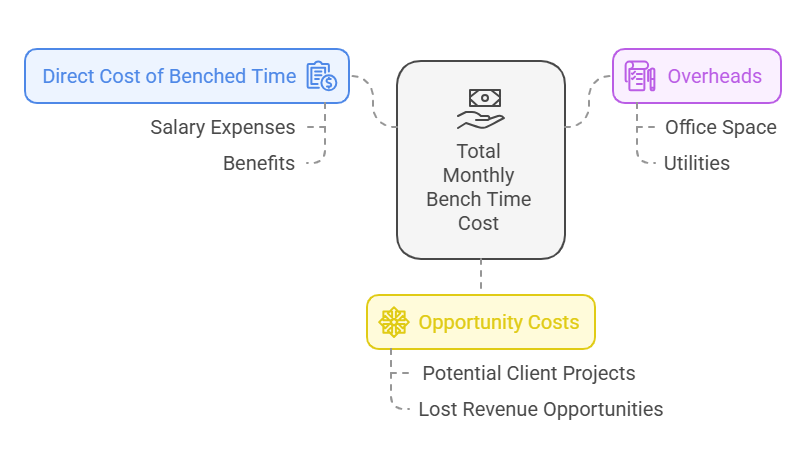BenchBee vs Clutch: Which Platform Solves Your Problem?
If you run an IT consultancy in the UK, there's a good chance you're already using Clutch. And that's brilliant -...
Read moreFirst and foremost, what is bench time in IT consultancy?
Bench time occurs when IT consultants are between client projects but still on the payroll. While every consultancy expects some gap between assignments, this non-billable time directly impacts profitability. Whether it’s a cloud architect who’s just completed a major transformation project or a DevOps specialist waiting for their next assignment, bench time represents valuable expertise sitting idle instead of generating revenue. For many IT consultancies, managing bench time effectively is the difference between profit and loss. IT firms lose thousands each month due to avoidable bench time mismanagement.
But it doesn’t have to be this way.
Take this scenario, your top cloud architect has just wrapped up a major digital transformation project. Now they’re sitting on the bench, costing your consultancy thousands in lost revenue each week. While some bench time is inevitable, most firms are losing more money than they realise through poor bench time management.
Top-performing consultancies maintain consultant utilisation rates of 80% or higher. Every percentage point below that benchmark directly impacts your bottom line. For a mid-sized consultancy with 50 consultants, even a 5% drop in utilisation can mean hundreds of thousands in lost revenue annually.
This blog explores five critical ways your bench time might be costing you money – and how modern resource management platforms like BenchBee help consultancies transform bench time into an opportunity.
Before diving into specific problems, let’s break down how bench time impacts your bottom line:
Use this formula to estimate your monthly bench time impact:
Total Monthly Bench Time Cost =
Direct Cost of Benched Time + Overheads and Opportunity Costs

Where:
For example, a consultancy with three senior consultants on the bench, each typically billing £800 per day, faces:
Most consultancies treat bench time as an unavoidable cost of doing business. This reactive approach means consultants often sit idle for weeks between projects, directly impacting profitability.
A London-based consultancy recently lost a month of billable time for two senior DevOps engineers between projects. Their experience shows how better resource optimisation could prevent significant losses:
Solution: Implement proactive bench time management strategies:
When consultants are on the bench, many firms focus solely on finding their next major project. This all-or-nothing approach to resource optimisation overlooks valuable opportunities.
A Manchester-based consultancy transformed their approach to bench time by splitting a senior cloud architect’s availability across three smaller projects:
Solution: Implement flexible resource optimisation strategies:
With technology evolving rapidly, bench time can quickly lead to skill degradation. In fast-moving areas like cloud architecture and DevOps, even a few weeks of inactivity can impact consultant marketability.
Recent industry analysis shows:
Solution: Transform bench time into strategic upskilling:
Many consultancies handle bench time in isolation, missing valuable opportunities for resource sharing and collaboration. This siloed approach to resource optimisation limits growth potential and increases financial risk.
A Leeds-based consultancy established a trusted partner network that transformed their approach to bench time:
Solution: Build strategic partnerships:
Beyond immediate financial losses, poor bench time management can significantly impact company culture and consultant retention. The hidden costs of decreased morale and increased turnover often exceed direct revenue losses.
A Birmingham-based firm tracked the relationship between bench time and consultant retention:
Solution: Implement comprehensive bench time management:
Transform your approach to bench time with these proven strategies:
Ready to rethink how your consultancy handles bench time? Discover how BenchBee’s platform helps consultancies maximise resource Optimisation and minimise bench time costs.
Transform your approach to bench time management. See how BenchBee’s platform can help you maximise consultant utilisation and boost profitability. Sign-up today.

If you run an IT consultancy in the UK, there's a good chance you're already using Clutch. And that's brilliant -...
Read more
Three months in, and BenchBee has been ranked number 74 in the TechRound100, a list that recognises some of the...
Read more
BenchBee operates on a simple principle: £350 per month gets you unlimited access to the entire network. No...
Read moreHire out your benched resources. Find the ones you do need. It’s easier with BenchBee.
